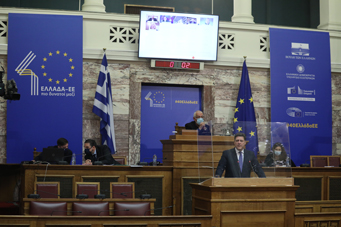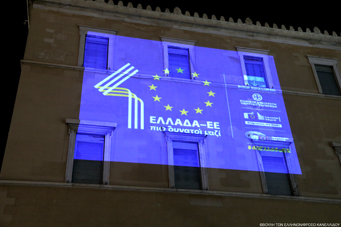They were followed by the representatives of the political parties in Parliament.
The joint logo of the anniversary was presented for the first time during the session.
Watch the presentation of the logo
here.
The Vice-President of the Hellenic Parliament and Chairman of the European Affairs Committee, Nikitas Kaklamanis, in his introduction, highlighted, inter alia, how the celebrations for the 200 years since the Greek Revolution and the 40 years since Greece's accession to the EEC provide a meeting place for our National and European identity and illuminate both. He went on to highlight the great role of Greece's ethnarch Konstantinos Karamanlis, whose personal vision it was for Greece to join the EU. 2021 is a year of reflection for the European Union as a whole, he pointed out, as this year the very important Conference on the Future of Europe is expected to commence, the aim of which should be to ensure the widest possible citizen participation, especially youth participation. He went on to say that we must also hear from the “romantic Eurosceptics” as he called them, or even from those “reluctant” towards the European idea as it is not necessarily they who are the enemies of the European Union. Fruitful reflection can lead us, he stressed, to identifying deficits, mistakes and missteps and it is this very reflection that will help us find solutions for the future of Europe.
The President of the Hellenic Parliament, Constantine Tassoulas said the following: “There is no need for me to extol the importance of the European political, economic and social unity and solidarity. What I would, however, like to underline is that for the first time in global history such a large community of nations was created based on free consent, equal cooperation, mutual respect and solidarity. Let us not forget that today, the EU has 27 member states, 27 different state entities, each with its own national personality, its own special idiosyncracy and its own national interests. Greece, welcoming the collective effort to build and complete the European ideal, which was based on the values of freedom, democracy, rule of law and the protection of human rights, preserves its national identity, promotes its culture and implements the principles of international law when exercising its foreign policy”.

Konstantinos Karamanlis' vision for a United European was at the centre of the speech by Alternate Foreign Minister for European Affairs, Miltiadis Varvitsiotis. Quoting from some of the historical speeches of the “ethnarch and father of the accession of Greece in the EU”, as he called him, Mr. Varvitsiotis spoke about the idea of European unification and pointed out that it was impossible for Greece not to participate in this historically and politically unique Union, where the future of the Greek people lay to begin with. Furthermore, he stressed that during these 40 years our country benefited politically, economically and strategically from its participation in the hard core of the Union, and noted the country's own contribution to European integration. He referred to the crises that plague the EU from time to time and then underlined that the Europe of the future needs to be stronger, more open, ambitious, sustainable and resilient, and fulfill the expectations of the new generation, with one voice in global affairs. He concluded by saying that “the stronger United Europe is, the stronger Greece's voice will be. Because for Greece, Europe is home. We are deeply European and we believe in this Europe. We provided its Greek name, after all”.
The Vice-President of the European Commission, Margaritis Schinas said the following: “The last 40 years are the longest period of peace, democracy and prosperity that Greeks have known. With Greece's accession to Europe, the wheel of history lived up to the expectations of generations and confirmed a relationship with a past, a present and a future. It secured our borders as Europe's farthermost frontiers against unpredictable and dangerous neighbours. It allowed rural areas to thrive, but also infrastructure, health and education systems, through colossal funds. It supported the economy and the society at crucial moments, when many turned their backs on us. The then goal of freedom of movement, residence and work and free trade in the world's largest market became a reality. It opened up unprecedented opportunities for mobility and education to thousands of young people. European Greece has achieved in the last 40 years what it hadn't achieved in the previous 160 years of its recent history."
The Vice-President of the European Parliament, Dimitris Papadimoulis made the following statement: "I have always maintained that Greece's accession to the then EEC was the correct choice for social, economic and geopolitical reasons. The pandemic crisis, along with the debt crisis of the previous decade highlight weaknesses and shortcomings which in turn underline the need for the EU to move swiftly towards social and political unification, with a deepening democracy and a continuous strengthening of the role of the European Parliament. The best defence of the idea of a united Europe is the constant effort to transform it into a truly unified Europe, socially and environmentally sustainable, free of inequalities and exclusions." 
The special commemorative session was concluded with the illumination of the Parliament building's façade with the logo of the 40-year anniversary.
Attached you will find the speech by 1) the President of the Hellenic Parliament, Constantine Tassoulas and 2) the 1st Vice-President of the Hellenic Parliament, Nikitas Kaklamanis (available in Greek only).